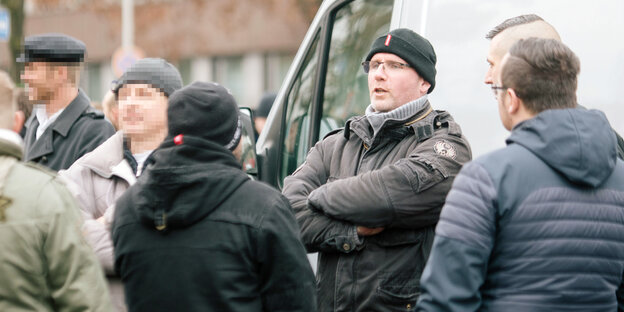Combat 18 was banned four years ago. Now four men have to go to court because they are said to have continued with the Nazi organisation.

Stanley Röske, described as head of the Combat 18 terrorist network, in 2019 Photo: imago
SEDAN taz | The name alone leaves no room for doubt: “Combat 18” has the numbers 1 and 8 in its name as a reference to Adolf Hitler. The German branch of the openly neo-Nazi group in England was banned in 2020 by the then Interior Minister Horst Seehofer (CSU), after much doubt. The Federal Prosecutor's Office has filed charges against four alleged ringleaders. They are suspected of violating the ban and continuing with the organization.
The four men, including leader Stanley Röske, are said to have continued to operate Combat 18 together with other members until at least 2022. Since October 2020 they have hosted at least 14 conspiracy meetings, according to the Federal Prosecutor's Office. The neo-Nazis organized “spectacle marches” and carried out admission procedures for candidates they called “supporters.”
In addition to a practical exam, these admission procedures also included a theoretical part with questions about National Socialism. The four also organized right-wing rock concerts and sold recordings and clothing related to “Combat 18 Germany.” In particular, Röske is said to have linked the group to other right-wing extremists, including the martial arts group “Knockout 51” from Eisenach.
In April 2022, at the request of the Federal Prosecutor's Office, the police carried out a major raid on the far-right scene in eleven federal states. Investigators targeted several neo-Nazi organizations, including Combat 18 and Knockout 51. Federal prosecutors had indications that Combat 18 was still operating.
Connections with Zschäpe
Three of the defendants are the men who previously led the tightly organized neo-Nazi group. Röske is a former neo-Nazi from Kassel who moved to Thuringia and also surrounded himself with Stephan Ernst, the murderer of Kassel district president Walter Lübcke.
The Thuringian Keven L., Röske's deputy, is also accused. He had previously been involved with the far-right splinter party The Right. Robin S., originally from Castrop-Rauxel in North Rhine-Westphalia, was a pen pal of NSU terrorist Beate Zschäpes and was jailed for shooting a migrant during an attack, and will also have to go to court. The fourth, Gregor M., allegedly organized the right-wing rock concerts and distributed the CDs and clothing together with Röske.
The four men are fugitives. They will have to respond to the State Security Senate of the Higher Regional Court in Düsseldorf. The Federal Prosecutor's Office temporarily investigated a total of 21 suspects. The cases against 17 alleged members were handed over to responsible state prosecutors in the summer of 2023.
Federal Interior Minister Nancy Faeser (SPD) stressed on Thursday that, after a ban, the security authorities closely monitor whether a group continues its activities. This is demonstrated by the accusation of the Federal Attorney General. “Any continuation of the activity of the 'Combat 18 Germany' club is punishable and will be pursued very rigorously,” said Faeser. And furthermore: “We are and will continue to be very attentive. “We are doing everything possible to dismantle far-right networks and groups, deprive them of their financial sources and systematically disarm them.”